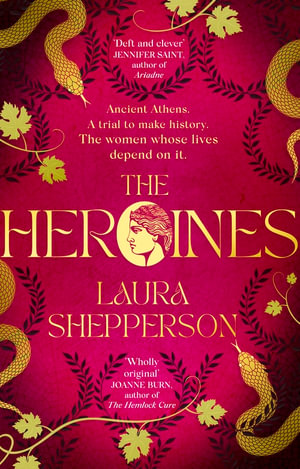The heroines by Laura Shepperson

The prologue to Laura Shepperson’s version of the mythical Phaedra story sets the scene with the bard adapting his storytelling to the tastes of his audience, so the foreign princess becomes a seductress; Hippolytus, the macho son of Theseus is cheered; and the whole story is embellished to the cheers of the audience. The story is not the truth, the bard himself has no idea what the truth is, and he does not give a second thought to the hooded figures on the edge of crowd, the women, for their opinion is worthless.
At the heart of Shepperson’s story of Phaedra is a trial, the first of its kind in Athens, where the Cretan princess Phaedra accuses her step-son Hippolytus of rape. It is the word of one miserable woman against the word of the prince, in a world where women are used and abused. There is a whole chorus of women who have suffered at the hands of men. Phaedra hears their cries at night:
It happened to me.
And me. And me.
Me too.
Phaedra increasingly finds the strength within herself to stand up against the mistreatment of women. But she could not find herself in a more hostile situation.
In this intriguing version of the Greek myths, Shepperson suggests that perhaps the stories of women visited by gods are the excuse that desperate women in Phaedra’s situation revert to. How can she face the return of her husband to find her pregnant to another man? So perhaps she could say she was sitting by the shore awaiting his return and was visited by the god Poseidon instead. Then her child would be half god, and must be revered.
Stories of the gods may have been invented to account for all sorts of strange events. Perhaps there is a similar explanation behind the story of her mother’s birthing of the Minotaur. Indeed, was the Minotaur even a strange beast? Phaedra knows him only as a gentle kind brother hidden away from the view of outsiders.
Stories can be twisted and turned, innocent people can find themselves reviled by the crowd, just as can occur in our present times of social media, cyberbullying and trolls. This story drawing on Greek mythology has just as much relevance today in the times of court cases and ‘me too’ protests. Shepperson’s historical fantasy novel shines a light on the world of women in ancient Greece, but can also be seen as having parallels with the situation for modern day rape victims and casualties of social media.
This is another feminist retelling of ancient stories which would definitely be a winner with readers who enjoyed Jennifer Saint’s books, Ariadne and Elektra.
Themes: Greek mythology, Women, Power, Rape, Lies, Abuse, ‘Me too’.
Helen Eddy